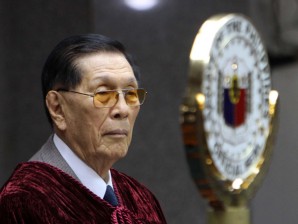A day after the Senate impeachment court issued a landmark ruling removing Chief Justice Renato Corona, Senate President Juan Ponce Enrile on Wednesday warned him against questioning the decision in the Supreme Court.
Enrile, who presided over the 44-day impeachment trial, and masterly steered it to its conclusion last Tuesday, maintained that the Senate had “the sole power to try and decide all impeachment cases” under the Constitution.
“I will say this very frankly and I hope they understand—if they (the Supreme Court) will question the jurisdiction of the impeachment court and reverse our decision, we will defy them,” he said in an interview with ANC where he kicked off a series of TV and radio interview, apparently to explain the verdict.
“If they want a constitutional crisis in this country, they will have one.”
Corona’s conviction marked the first ever completed impeachment trial in the country’s history. In 2001, a similar ouster proceeding in the Senate against then President Joseph Estrada was aborted following a prosecution walkout.
Enrile was visibly in combat mode when the issue of appeal was raised the morning after 20 of the 23 members of the Senate impeachment court voted to convict Corona for his failure to declare dollar and peso deposits in his statements of assets, liabilities and net worth (SALN).
Enrile expressed doubts over how a Supreme Court decision reversing the conviction of Corona could be enforced, considering that the Senate was “outside the jurisdiction of the Supreme Court in terms of the trial and judgment in an impeachment case.”
“They cannot review our decision,” he said. “Otherwise, they will be the one to make the final decision in violation of the Constitution, which says that the Senate has the sole power to decide and try all impeachment cases.”
Replacement not outsider
With Corona now out of the way, President Benigno Aquino III is set to pick a replacement, but Enrile said the new Chief Justice should come from among the incumbent members of the tribunal.
“The President cannot appoint an outsider because right now, there is no JBC,” he said, referring to the Judicial and Bar Council that screens applications and submits a list of nominees for the high tribunal. The JBC is headed by the sitting Chief Justice.
Saying the 1987 Constitution does not allow an “acting” Chief Justice, the senator argued that there would be no one to head the JBC.
“Since there is no JBC, so to speak, because the Chief Justice is the chairman of the JBC, the President, by force of necessity, must appoint a Chief Justice (from) among those incumbent justices of the Supreme Court, the 14 remaining justices,” he said.
Drilon considered
Among the names floated as a possible replacement for Corona was that of Senator Franklin Drilon, who had voted to convict the Chief Justice. Drilon is a staunch ally of Mr. Aquino, who had actively campaigned for Corona’s ouster.
Drilon on Wednesday denied that he was eyeing the position.
Enrile commended
“To set the fact straight, I am not interested in the position of the Chief Justice of the Supreme Court,” he said in a statement. “I believe I can serve our country better as a senator. I intend to finish my term as a senator and fulfill the mandate that was given to me by the 15.8 million Filipinos who voted for me last election.”
Senator Jose “Jinggoy” Estrada, the Senate President Pro Tempore, delivered a privilege speech commending Enrile for the way he had presided over the impeachment trial. The speech was later converted into a formal resolution.
Estrada appeared to have softened his position on Corona after he joined 19 other senators in voting to remove the Chief Justice. He claimed he had contacted “one of the allies of the President” the other night and asked that Corona be spared from further investigation.
“Since the impeachment court has already handed down a verdict to remove him from office, I hope no charges would be filed against him anymore,” he said.
“It’s painful enough that you removed him, yet you would still file cases against him,” he said, recalling his family’s experience during the Arroyo administration.
Estrada—along with his father, former President Joseph Estrada—was jailed. But while the senator was later on cleared, the older Estrada was convicted of plunder but promptly pardoned by then President Gloria Macapagal-Arroyo.
“I don’t want that to happen to anybody else because it’s a very, very painful experience,” he said.
